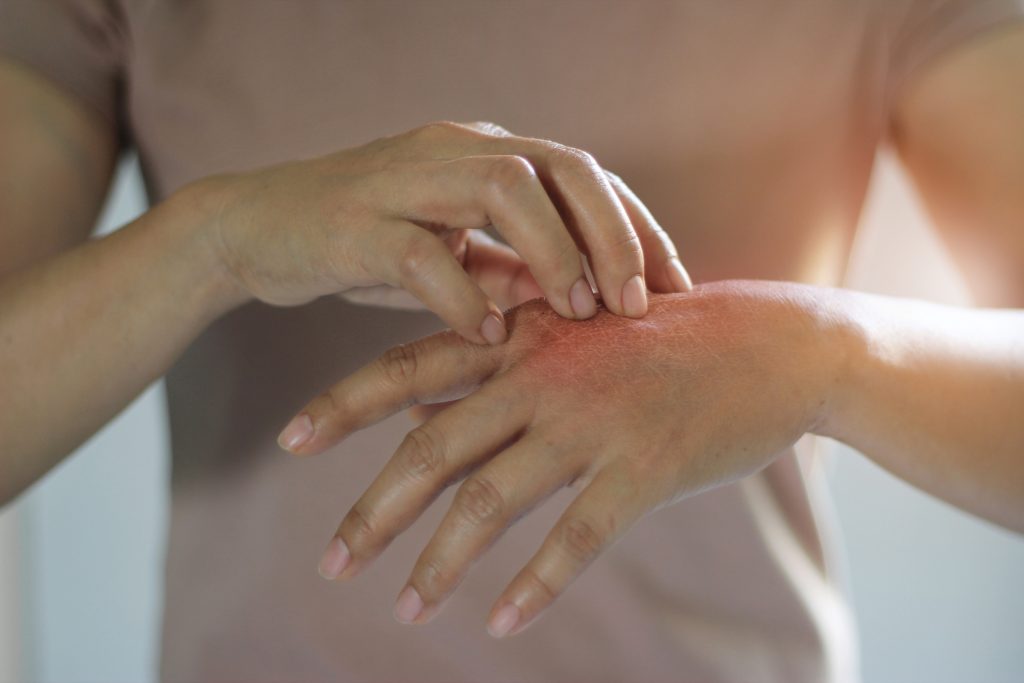Winter weather can be tough on your skin, especially if you’re prone to eczema. The cold air, low humidity, and indoor heating can strip your skin of essential moisture, leading to dryness, itching, and irritation. At DermSurgery Associates, we understand the challenges eczema sufferers face during the colder months. If your eczema tends to flare up in winter, these simple but effective tips can help you keep your skin healthy and comfortable.
Take Shorter Showers
Long showers might feel relaxing, especially when it’s cold outside, but they can do more harm than good for your skin. Spending too much time in the shower can strip your skin of natural oils, leaving it dry and vulnerable to irritation.
- Aim to keep your showers under 10 minutes to minimize water exposure.
- Avoid scrubbing too hard, which can further irritate sensitive skin.
Shortening your shower time is one of the easiest ways to prevent your skin from drying out during winter.
Use Lukewarm Water Instead of Hot
While hot showers or baths can feel soothing on a chilly day, they can actually make your skin worse. Hot water strips the skin of its natural protective barrier, leaving it drier and itchier—especially if you already have eczema or sensitive skin.
- Stick to lukewarm water for both showers and handwashing.
- Pat your skin dry gently with a towel instead of rubbing it.
Choosing lukewarm water over hot will help retain your skin’s moisture and reduce irritation.
Moisturize Frequently and Effectively
Moisturizing is one of the most important steps in keeping eczema-prone skin healthy during winter. Dry skin needs extra hydration, and applying a moisturizer multiple times a day can make a big difference.
- Use a thick, fragrance-free moisturizer immediately after bathing to lock in moisture.
- Keep a travel-sized moisturizer handy to reapply throughout the day.
- Aim for 2 to 4 applications daily if your skin is extremely dry.
Regular and consistent moisturizing helps strengthen your skin barrier, reducing flare-ups and discomfort.
Additional Tips for Winter Skin Care
In addition to keeping showers short, using lukewarm water, and moisturizing regularly, there are other simple changes you can make to protect your skin during the winter. These extra steps can help manage eczema and keep your skin feeling its best all season long.
Use a Humidifier
Indoor heating systems often lead to dry air, which can exacerbate eczema symptoms. A humidifier adds moisture to the air, helping your skin retain hydration and reducing itchiness. Place one in your bedroom or main living area to keep the air comfortably moist during the winter months.
Wear Skin-Friendly Clothing
Cold weather calls for layers, but not all fabrics are kind to sensitive skin. Wool and synthetic materials can cause irritation, especially if they come into direct contact with eczema-prone areas. Opt for soft, breathable fabrics like cotton, and use wool sweaters as outer layers to avoid direct skin contact.
Switch to Gentle Cleansers
Many soaps and cleansers contain harsh ingredients that can strip away natural oils and irritate sensitive skin. Choose fragrance-free, hypoallergenic cleansers that are specifically formulated for dry or eczema-prone skin. Look for products labeled “soap-free” to ensure they’re gentle on your skin.
Taking these small steps can significantly improve your skin’s resilience during the colder months.
Preventing Eczema Flare-Ups
In addition to the tips above, you can take proactive measures to minimize eczema triggers and keep flare-ups under control:
- Stay Hydrated: Drink plenty of water to keep your skin hydrated from the inside out. Dehydration can make dryness and irritation worse, so aim to maintain your fluid intake even when it’s cold outside.
- Protect Your Skin Outdoors: Cold, windy weather can sap moisture from your skin. Wearing gloves, scarves, and hats can protect sensitive areas and reduce irritation caused by exposure.
- Be Gentle on Your Skin: Avoid scratching or rubbing dry patches, as this can worsen inflammation and increase the risk of infection.
- Control Indoor Temperatures: Overheating your home can make the air drier, further aggravating eczema symptoms. Keep your thermostat at a moderate temperature and consider using a humidifier to balance the moisture in the air.
- Stick to a Consistent Skincare Routine: It’s important to maintain a steady regimen year-round, even during times when your skin feels more manageable. Regular moisturizing and using gentle cleansers can prevent flare-ups before they start.
By addressing these common triggers, you can help prevent flare-ups and maintain smoother, healthier skin throughout the winter.
When To See a Dermatologist
If your eczema worsens despite your best efforts or you’re experiencing severe itching, redness, or cracking, it may be time to seek professional help. A dermatologist can provide personalized recommendations and treatments tailored to your skin’s needs.
Protect Your Skin This Winter
If your eczema persists or worsens, our knowledgeable dermatologists can help you regain control of your skin health. Call our office today at (713) 791-9966 or request a consultation to discuss your eczema or any other skin concerns. Winter might be harsh, but with the right care, your skin doesn’t have to suffer.


Leave a Reply